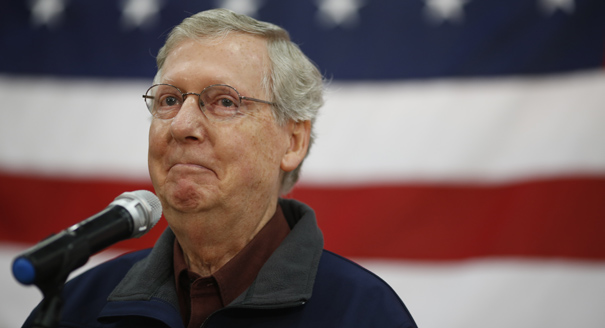Last night the party of President Obama was routed in spectacular fashion, as Republicans gained more than enough to take control of the Senate and fortify their healthy numbers in the House of Representatives.
There’s no shortage of reading this morning for the politicos, so I would refer you elsewhere for comprehensive reaction. But I do want to take a minute and contemplate some interesting facts pertaining to the election results and abortion.
Pro-life candidates had tremendous success last night. Or, perhaps more accurately, aggressive pro-choice candidates flamed out big time. Wendy Davis, a “liberal rock star” who gained notoriety for her 11-hour filibuster of a Texas law that would restrict late-term abortions, was blown out by the pro-life Greg Abbott. Mark Udall, the incumbent Senator for Colorado, oriented his campaign against Republican challenger Cory Gardner so exclusively on “reproductive rights” to the point that The Denver Post, in its endorsement of Gardner, ridiculed him for trying to scare voters that Gardner would criminalize birth control. Gardner defeated Udall in a major victory for Republicans.
Alison Grimes opposed late-term abortion restrictions and got rolled by Mitch McConnell in Kentucky. Kay Hagan campaigned to reverse the Supreme Court’s Hobby Lobby decision and was handed a “devastating” loss by Republican Thom Tillis. And Joni Ernst, one of the most pro-life Senate candidates in years, triumphed over Democrat Bruce Braley. In sum, it was complete domination for candidates who campaigned for life.
Yet it wasn’t a complete triumph for pro-life legislation. Tennessee did approve a light amendment that merely denies any inherent right to abortion in the state’s constitution. Unfortunately two other pro-life measures failed out West in Colorado and North Dakota:
In March, Corey Gardner, who won his Senate bid in a tight race, withdrew his support for Colorado’s personhood amendment. Amendment 67 redefined “person” and “child” to include “unborn human beings” in state law. Gardner said he had concerns the law might limit access to contraceptives. In September, he announced his support for over-the-counter oral contraceptives.
As in Colorado, voters in North Dakota did not turn out to support a proposed pro-life amendment. The state’s pro-lifers previously attempted to pass a personhood amendment in 2013. But this year’s amendment, called the Human Life Amendment, or Measure 1, represented a strategic shift away from personhood amendments in the state. Unlike previous attempts, Measure 1 didn’t seek to define life at conception. Rather, it aimed to protect existing regulation.
Janne Myrdal, Concerned Women for America’s North Dakota state director, believes “personhood amendments” can carry negative connotations because the term “personhood” has been hijacked by the opposition to represent a radical, “anti-choice” movement. “[The abortion industry] is trying to vilify one part of the pro-life movement, and we’re not going to join them in that,” Myrdal said.
What to make of this?
First, the failure of measures in North Dakota and Colorado mean that it might be too early to speak of the country as moving towards the right on abortion. I suspect that we are, for a few reasons (low national support for unrestricted abortion being one), but clearly many American voters are not willing to toss out existing abortion access.
Second, the failure of pro-choice candidates in last night’s elections suggests that the Democratic Party might not control the conversation about abortion and reproductive issues. Wendy Davis and Mark Udall both campaigned strongly on a “war on women” platform, and both lost; Davis was even defeated among women by almost 10 points. The narrative of persecuted reproductive autonomy seems to be near or past its expiration date.
Thirdly, I’m suspicious, putting those two observations together, that the pro-life movement is getting in its own way. It almost seems as if voters are ready to dump the voice of Planned Parenthood but don’t yet feel assured that the world created by pro-life law will be safe for everyone. Pro-life voices have focused for several years, understandably, on the gross and destructive nature of abortion and the shallow arguments against unborn personhood. Yet there needs to be an “aftermath” question: If pro-life laws prevail, what will happen to women who have had abortions? Will there be criminal trials for teenage girls who get an unlawful procedure?
I think conservative pro-lifers have good answers to these questions, but they need to make them clear. A personhood amendment that ties into homicide law may not send the right signal about the world that pro-life wants to create. Given the triumphs of pro-life candidates, and the embarrassments of pro-choice ones, it feels like the ball is in our court.












